Expeditions to demystify data
Guest post by Julian Tait, Open Data Manchester.
Over the past few months, Open Data Manchester has been working with 360Giving to develop and deliver data training in innovative ways.
 To many people, the world of data is abstract and arcane. Even though there is an understanding of data’s importance in the modern world it is generally invisible, occasionally popping up in negative news stories or when trying to buy a data package for a phone.
To many people, the world of data is abstract and arcane. Even though there is an understanding of data’s importance in the modern world it is generally invisible, occasionally popping up in negative news stories or when trying to buy a data package for a phone.
One of the techniques we feel is particularly effective in demystifying data is the Data Expedition. Originally developed by the School of Data, data expeditions create a narrative structure for the use of data that identifies and builds upon individual skills and competencies, encourage team building and sets out a route that participants can follow to help identify and answer questions through data.
Ideally data expeditions should take place over two days as there is much to cover. Unfortunately few organisations can make that level of time commitment and so a condensed one-day version drawing on some of the main elements has been created.

At the start of an expedition we ask people to assess their skill-set by filling out a “data explorer” profile using five axes. This emphasises that using and making sense out of data needs a broad selection of skills. The approach is light-hearted and reflective with scoring metrics on the reverse of the data explorer sheet.
The data explorer profile has a number of functions and although it helps people to think about their skills, we also use it as an icebreaker, giving participants the opportunity to stand up and tell the group about their profile.
The next step is for people to think of the questions they want to ask. This helps start discussions as to what can and can’t be answered using data and might be based upon questions the explorers had previously identified or new ones. During a data expedition for the Local Trust, participants thought of questions that were as expansive as ‘What is the value of youth work?’ to ‘What are the local factors that affect communities in Wigan?
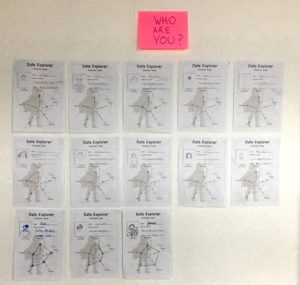 Question definition needs to be well facilitated as it is easy to formulate questions that are too vague, broad or subjective. The questions are put on the wall and clustered. Participants choose the questions they want to explore and groups are then formed around these questions. As facilitators it’s important that we are mindful that teams – ideally of 3-5 people – are balanced in skills and temperament. As defining good questions is crucial for the running of a Data Expedition, it may be necessary to hold a question definition workshop prior to the event. It is vital that people involved with any question definition workshop also participate in the data expedition as the rationale behind the questions needs to be shared.
Question definition needs to be well facilitated as it is easy to formulate questions that are too vague, broad or subjective. The questions are put on the wall and clustered. Participants choose the questions they want to explore and groups are then formed around these questions. As facilitators it’s important that we are mindful that teams – ideally of 3-5 people – are balanced in skills and temperament. As defining good questions is crucial for the running of a Data Expedition, it may be necessary to hold a question definition workshop prior to the event. It is vital that people involved with any question definition workshop also participate in the data expedition as the rationale behind the questions needs to be shared.
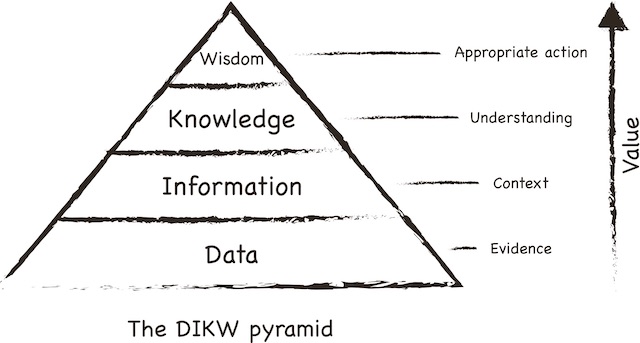 Before the teams embark on their expeditions we give them a map and a route. The Data – Information – Knowledge – Wisdom (DIKW) pyramid is a hierarchical map that emphasises the value of context and domain experience when using data. This helps temper any notion that data is an end in itself and is part of a bigger human decision-making process.
Before the teams embark on their expeditions we give them a map and a route. The Data – Information – Knowledge – Wisdom (DIKW) pyramid is a hierarchical map that emphasises the value of context and domain experience when using data. This helps temper any notion that data is an end in itself and is part of a bigger human decision-making process.
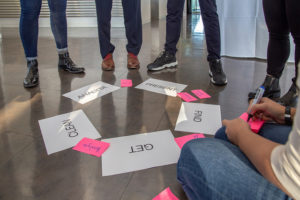
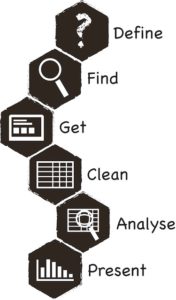 The route that we introduce is the Data Pipeline. This guides participants through different stages of answering questions using data and although the pipeline looks like a linear process explorers are encouraged to order the stages in a way that reflects their working practices.
The route that we introduce is the Data Pipeline. This guides participants through different stages of answering questions using data and although the pipeline looks like a linear process explorers are encouraged to order the stages in a way that reflects their working practices.
The object of the exercise is to prompt a discussion as to how the stages relate to each other and the dependencies that exist. Although there is no perfect answer the better solutions involve feedback mechanisms that can accommodate potential problems when encountered.
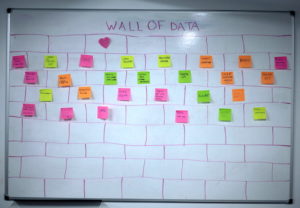
The teams then set off on their expeditions. To chart their route we ask them to populate a Wall of Data that we fill in with tools, websites and datasets that are found to be useful or of interest to others. If the expedition is with a large group (15+) setting up a Slack channel makes it easy for questions and people helping each other out.
Half way through this main stage of the expedition, teams are asked to feedback on where they are up to, what they have found out and any challenges they are facing. Any data enquiry can be challenging and feedback allows the sharing of frustrations, achievements and work-arounds.
 At the outset we emphasise that the data expedition is a journey of discovery and that there are no bad questions or wrong answers. The format of the day is to facilitate thinking about how data can be used within their own practice and what can and can’t be answered with available data.
At the outset we emphasise that the data expedition is a journey of discovery and that there are no bad questions or wrong answers. The format of the day is to facilitate thinking about how data can be used within their own practice and what can and can’t be answered with available data.
The day finishes with a show and tell session where teams share their findings and what they’ve learned. Depending on the teams and the complexity of the enquiry these can range from an understanding of the challenges faced when trying to access relevant data, to full-blown visualisations.
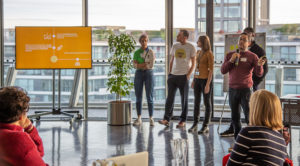 The Data Expedition is an evolving format and Open Data Manchester is part of a community of open data and data literacy advocates that are developing modular resources that are freely available on Github.
The Data Expedition is an evolving format and Open Data Manchester is part of a community of open data and data literacy advocates that are developing modular resources that are freely available on Github.
Open Data Manchester is working with 360Giving on a series of data expeditions, including this one on sport, in partnership with the Greater London Authority.
